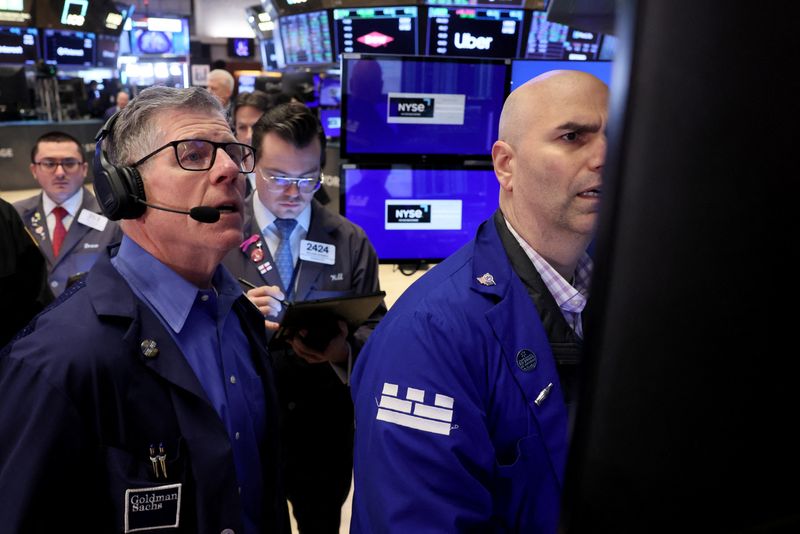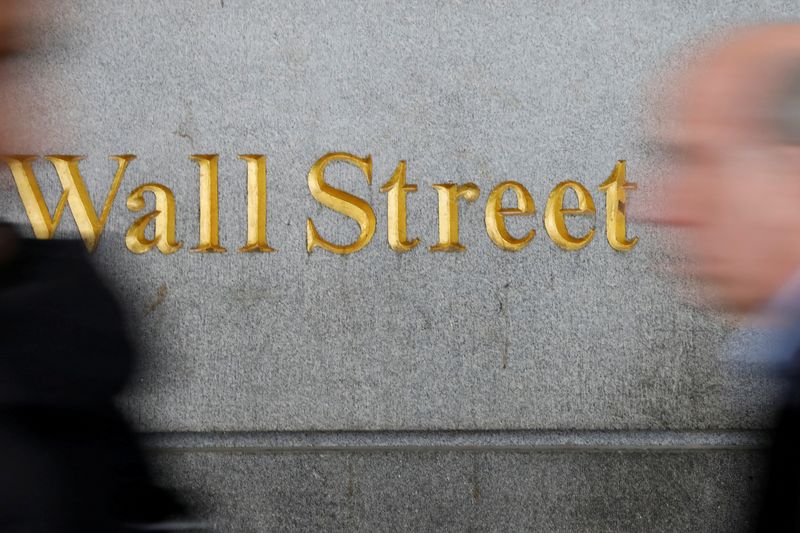By Mike Dolan
LONDON (Reuters) -Often the scariest thing in markets is a rout without a trigger.
People are still unsure about the precise cause of the October 1987 crash, for example. And when the Nasdaq clocked a 10% one-day drop in April 2000, marking the first pop in the dot.com bubble, there were blank stares and collective shrugs about just why that particular day hit so hard.
The latest shakeout of pricey megacaps has been modest by comparison. But there's been similar head-scratching as to why Wall St and global stocks registered their worst day since 2022 on Wednesday after hitting record highs earlier this month.
There's no shortage of theories. And long-term bears have been warning of a correction in overly concentrated stock indexes for more than a year now amid concern about excessive hype - and capex spending - surrounding artificial intelligence.
But there was no obvious smoking gun on Wednesday.
Pre-election jitters, China's worrying slowdown, earnings seasons outliers such as Tesla (NASDAQ:TSLA), and Japanese yen volatility have all been posited as potential culprits.
Whatever the 'real' answer is, it certainly wasn't worries about rising borrowing costs or higher-for-longer interest rates - the prime suspect in similar recoils this time last year and again in April.
If anything we saw the beginnings of a rotation from equities to bonds, as Federal Reserve easing bets went up a gear, Treasury yields skidded and central banks in China and Canada cut interest rates.
REARVIEW CLEAR
So is the sudden discomfort with expensive stocks a fundamental growth concern that's been off radar all year?
You'd think not just looking at the incoming corporate earnings season or Thursday's robust second-quarter U.S. gross domestic product release.
There's a high bar for companies looking to impress markets - but annual profit growth for the S&P500 is tracking 11.6% so far - a point higher than estimated on July 1, according to LSEG data. And analysts are expecting this to accelerate to roughly 15% for calendar 2025 - also one point higher than they were predicting just two months ago.
"We wouldn't say there has been any major incremental change in outlook from companies in early reporting to date," reckons Janus Henderson Investors portfolio manager Richard Clode.
Slowing GDP then? Not a bit of it yet.
Thursday's update showed the U.S. economy grew to an above-forecast clip of 2.8% in the three months to June, registering solid gains in consumer spending and business investment and with easing inflation gauges.
ADJUST YOUR SET
To be fair, these Q2 GDP and the corporate reports are backward looking and the horizon may be murkier due to the increasingly uncertain November U.S election - where events have already been tumultuous this month.
Noel Dixon, global macro strategist at State Street (NYSE:STT) Global Markets, thinks clients have been forced to "adjust their positions" given the sudden swing in election forecasts. What looked like a shoo-in for former-President Donald Trump now appears to be more of a toss-up, as Trump faces a "more formidable" opponent in Vice President Kamala Harris.
If excitement and momentum builds around Harris' chances, Dixon reckons, there could be some speculation about her apparent preference for higher corporate taxes and regulation. There's now even talk of a potential clean sweep of the White House and Congress by Democrats, an outcome that seemed unthinkable at this time last week.
But it still seems hasty, or at least very early, to bet the farm on such uncertain outcomes.
That's not least because the Fed meets next week and is now nailed on to deliver its first rate cut by September - with one eye on a national employment report on Friday that seems to be gaining more of the central bank's attention.
While markets are ascribing virtually zero chance that the Fed will make a move on Wednesday, comments from a former Fed official raised eyebrows in this week's volatile trading.
In a Bloomberg op-ed published on Wednesday, former New York Fed boss Bill Dudley called for an immediate rate cut due to labor market cooling and the increasing likelihood of a recession. He cited the so-called Sahm Rule, pointing out that the speed at which a rising jobless rate presages recession is now close to being triggered.
"I've changed my mind. The Fed should cut, preferably at next week's policy meeting," wrote Dudley. "Although it might already be too late to fend off a recession by cutting rates, dawdling now unnecessarily increases the risk."
Could that be enough to trigger a market rethink on "what the Fed knows that we don't know"?
That seems a stretch.
But evoking the 'R' word now is notable, given the near consensus on a soft landing ahead.
Perhaps this suggests the market is simply too priced for perfection and now becoming fearful of its own exuberance.

And as is often the case, what markets fear more than anything is themselves.
The opinions expressed here are those of the author, a columnist for Reuters.
(by Mike Dolan X: @reutersMikeD; Editing by Stephen Coates)
